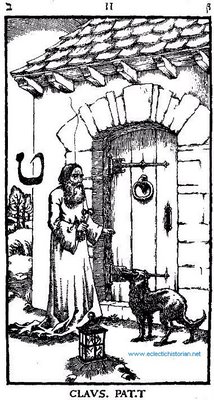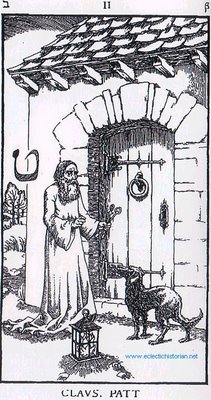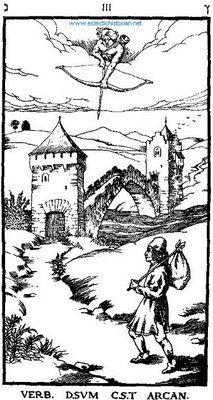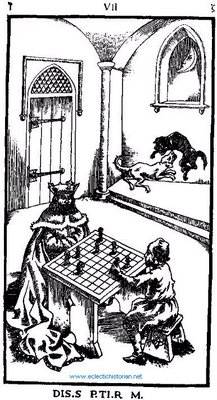A rare bookdealer Dean Corso (Johnny Depp) is hired by an antique book collector/publishing tycoon Boris Balkan (Frank Langella),(intent on summoning the Devil) to track down the whereabouts of a book
'The Nine Gates of the Kingdom of Shadows'...

The film is based on the novel '
El Club Dumas' by spanish writer
Arturo Perez-Reverte. Haven't read the novel - as I can't read spanish - and don't know if an english translation exists? Anyway, getting back to the movie - Balkan obtains a copy of
The Nine Gates of the Kingdom of Shadows
by Aristide Torchia (Reverte based Torchia's life on 17th century philosopher
Giordano Bruno). Realising the copy could have been forged, Balkan pays Corso to locate and examine the other two existing copies. If either of the two copies is original, Balkan wants Corso to bring them to him.
Corso discovers that the differences between each of the three copies is in the illustrations and not the text. Some of the illustrations are signed LCF (by Lucifer
i.e. the Devil) while others are signed by the book's author Aristide Torchia (burned at the stake after accusations of having written the book in collaboration with the Devil).
There are some notable differences in some of the pictures. However, in some, the only difference is whether the illustration is signed or not.

Frontispiece from the novel (above) and film (below).
Title & Translation:
Latin:
Novem Portis de Umbrarum Regni
The Club Dumas: Nine Doors of the Kingdom of Shadows
The Ninth Gate: The Nine Gates of the Kingdom of Shadows
Motto & Translation:
Latin:
SIC LUCEAT LUX
Club Dumas: Thus shines the Light
Ninth Gate: Thus let the Light shine


Engraving I from the novel (above) and film (below).
Caption & Translation:
The Club Dumas:
Latin:
NEMO PERVENIT QUI NON LEGITIME CERTAVERIT
English: Only he who has fought according to the rules will succeed
The Ninth Gate:
Latin:
SILENTIUM EST AUREUM
English: Silence is golden


Engraving II from the novel (above) and film (below).
Caption & Translation:
Latin: CLAUSAE PATENT
The Club Dumas: They open that which is closed
The Ninth Gate: Open that which is closed


Engraving III from the novel (above) and film (below).
Caption & Translation:
Latin: VERBUM DIMISSUM CUSTODIAT ARCANUM
The Club Dumas: The lost word keeps the secret
The Ninth Gate: Wasted breath keeps a secret


Engraving IIII from the novel (above) and film (below).
Caption & Translation:
Latin: FORTUNA NON OMNIBUS AEQUE
The Club Dumas: Fate is not the same for all
The Ninth Gate: Chance is not the same for all


Engraving V from the novel (above) and film (below).
Caption & Translation:
Latin:
FRUSTRA
The Club Dumas: In vain
The Ninth Gate: In vain


Engraving VI from the novel (above) and film (below).
Caption & Translation:
Latin:
DITESCO MORI
The Club Dumas: I am enriched by death
The Ninth Gate: I enrich myself with death


Engraving VII from the novel (above) and film (below).
Caption & Translation:
Latin:
DISCIPULUS POTIOR MAGISTRO
The Club Dumas: The disciple surpasses the master
The Ninth Gate: The disciple outshines the master


Engraving VIII from the novel (above) and film (below).
Caption & Translation:
Latin:
VICTA IACET VIRTUS
The Club Dumas: Virtue lies defeated
The Ninth Gate: Virtue is conquered


Engraving VIIII from the novel (above) and film (below).
Caption & Translation:
Latin:
NUNC SCIO TENEBRIS LUX
The Club Dumas: Now I know that darkness comes from light
The Ninth Gate: I know now that the shadows come from light

The captions, translations and
illustrations displayed here, are available in a larger size at
http://www.eclectichistorian.net/Engravings/ courtesy of eclectichistorian.
 Latin: Ut Vitam Habeant "so that they may have life"
Latin: Ut Vitam Habeant "so that they may have life"















